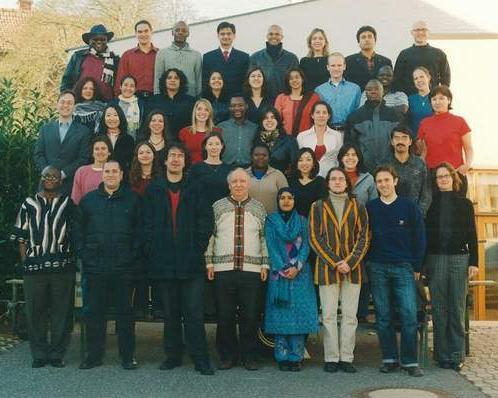| Posted: April 26 2005,02:09 |
If you wrote this report, you will find a button here that you may click
in order to make changes in the report. 
|
PROGRESS: Has your organization seen
progress toward a culture of peace and nonviolence in your domain of
action and in your constituency during the first half of the Decade? |
Yes. We can assess it by:
- the increasing number of applications: they have doubled in the last two years.
- students take more classes than they are required
- students volunteer to organise activities at the local school, involve with the local community and do internships.
- No serious conflict among all involved (participants, professors)
|
OBSTACLES: What are the most important obstacles that have prevented progress?
|
- Scarcity of scholarships. They have been reduced by 80% in the past 10 years.
|
ACTIONS: What actions have been
undertaken by your organization to promote a culture of peace and
nonviolence during the first half of the Decade?
|
The
EPU (European University Center for Peace Studies) is an international,
non-governmental organisation with UNESCO status, and is affiliated to
the Austrian Study Center for Peace and Conflict Resolution (ASPR),
also located at Stadtschlaining. It was founded in 1988 by Gerald Mader
in his capacity as president of the ASPR, with the support of European
UNESCO commissions. The original curriculum of EPU was designed along
the lines of Johan Galtung’s ” Plan for a Master of Peace and Conflict
Resolution” which he developed for the University of Hawaii.
Galtung teaches each fall and spring at EPU.
The EPU has
been offering postgraduate programs in Peace Studies since 1990. In
1995, EPU was co-winner of the UNESCO Prize for Peace Education. The
EPU’s UNESCO Chair on Peace, Human Rights and Democracy was established
in 1996.
Primary goals of the EPU are:
spreading the idea of peace in the spirit of the UNESCO;
giving scientific and educational support to peace building in Europe as inspired by the OSCE process;
promoting a "world domestic policy" based on sustainable development, cooperative responsibility and ecological security;
contributing to the development of a global peace culture;
training and improving individual capabilities in peace-making and conflict resolution.
EPU
has designed progams to provide students with the intellectual skills
to analyse conflicts and their underlying causes and with practical
skills in peace building and related fields. EPU adheres to the idea of
integrated learning, believing that learning needs to occur not only on
an intellectual level, but must take the person as a whole into
account. The faculty come from many different countries from every
continent and a wide variety of disciplines and emphasise a
transnational, transdisciplinary perspective in their teaching. They
bring practical experience as well as a profound theoretical background
to the EPU courses.
The Master of Arts in “Peace and Conflict
Studies” consists of two taught terms of three months each, a research
period in between these two terms plus a final research period for
completion of the M.A. thesis. Each term of this program can also be
attended individually and be completed with the award of a Certificate
for the Advanced International Study Program in Peace and Conflict
Transformation.
In addition to one-week sessions for
introduction, conclusion and a special analysis of the field of
conflict transformation, each term offers in-depth exploration of
several grouped themes. Each of these longer units incorporates aspects
of practical peace work.
The three main themes in the fall
semester (Oct-Dec) are non violence and disarmament; peace and global
economy; human rights, democracy and political participation. The
spring semester (March-May) covers peace education, peace culture,
development theories, alternative economics, reconciliation, peace and
deep culture, and leadership.

|
ADVICE: What advice would you like to
give to the Secretary-General and the General Assembly to promote a
culture of peace and nonviolence during the second half of the Decade? |
We
would advise him to support the training of large number of people in
every country in peaceful conflict transformation and peace initiatives
undertaken by civil society actors.
|
PARTNERSHIPS: What partnerships and
networks does your organization participate in, thus strengthening the
global movement for a culture of peace? |
Consortium for a European Master in Peace Studies, coordinated by the University of Florence.
|
PLANS: What new engagements are
planned by your organization to promote a culture of peace and
nonviolence in the second half of the Decade (2005-2010)? |
Expanding
number of students to be trained in developing strategies for peaceful
conflict transformation, reconciliation, sustainable development,
democratic participation and the respect for human rights.
Create a global network of schools and universities that teach peace.
|
Postal address of organization
|
Rochusplatz 1, A-7461 Stadtschlaining/ Austria, Tel.: ++43-(0) 3355 2498, Fax: ++43-(0) 3355 2381,
|
E-mail address of organization
|
fischer@epu.ac.at
|
Website address of organization
|
http://www.aspr.ac.at/welcome.htm
|
Highest priority action domain of a culture of peace
|
Peace Education
|
Second priority action domain of a culture of peace
|
International peace and security
|
Highest priority country of action (or international)
|
International
|
Second priority country of action (or international)
|
|
| Back to top |
|



